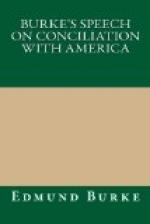My idea, therefore, without considering whether we yield as matter of right, or grant as matter of favor, is to admit the people of our Colonies into an interest in the Constitution; and, by recording that admission in the journals of Parliament, to give them as strong an assurance as the nature of the thing will admit, that we mean forever to adhere to that solemn declaration of systematic indulgence.
Some years ago the repeal of a revenue Act, upon its understood principle, might have served to show that we intended an unconditional abatement of the exercise of a taxing power. Such a measure was then sufficient to remove all suspicion, and to give perfect content. But unfortunate events since that time may make something further necessary; and not more necessary for the satisfaction of the Colonies than for the dignity and consistency of our own future proceedings.
I have taken a very incorrect measure of the disposition of the House if this proposal in itself would be received with dislike. I think, Sir, we have few American financiers. But our misfortune is, we are too acute, we are too exquisite [Footnote: 44] in our conjectures of the future, for men oppressed with such great and present evils. The more moderate among the opposers of Parliamentary concession freely confess that they hope no good from taxation, but they apprehend the Colonists have further views; and if this point were conceded, they would instantly attack the trade laws. [Footnote: 45] These gentlemen are convinced that this was the intention from the beginning, and the quarrel of the Americans with taxation was no more than a cloak and cover to this design. Such has been the language even of a gentleman of real moderation, and of a natural temper well adjusted to fair and equal government. I am, however, Sir, not a little surprised at this kind of discourse, whenever I hear it; and I am the more surprised on account of the arguments which I constantly find in company with it, and which are often urged from the same mouths and on the same day.
For instance, when we allege that it is against reason to tax a people under so many restraints in trade as the Americans, the noble lord in the blue ribbon shall tell you that the restraints on trade are futile and useless—of no advantage to us, and of no burthen to those on whom they are imposed; that the trade to America is not secured by the Acts of Navigation, but by the natural and irresistible advantage of a commercial preference.
Such is the merit of the trade laws in this posture of the debate. But when strong internal circumstances are urged against the taxes; when the scheme is dissected; when experience and the nature of things are brought to prove, and do prove, the utter impossibility of obtaining an effective revenue from the Colonies; when these things are pressed, or rather press themselves, so as to drive the advocates of Colony taxes to a clear admission of the futility of the scheme; then, Sir, the sleeping trade laws revive from their trance, and this useless taxation is to be kept sacred, not for its own sake, but as a counterguard and security of the laws of trade.




